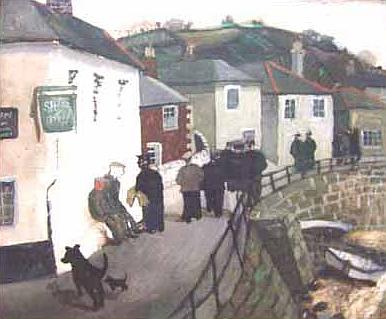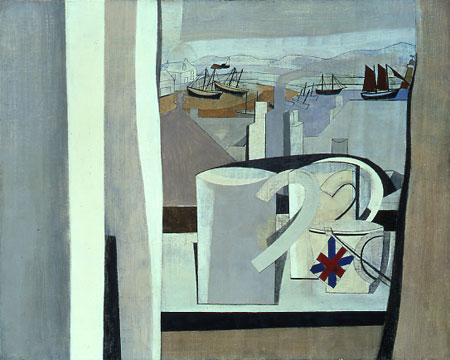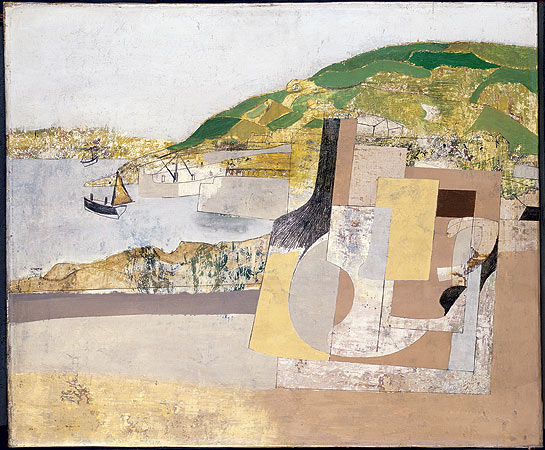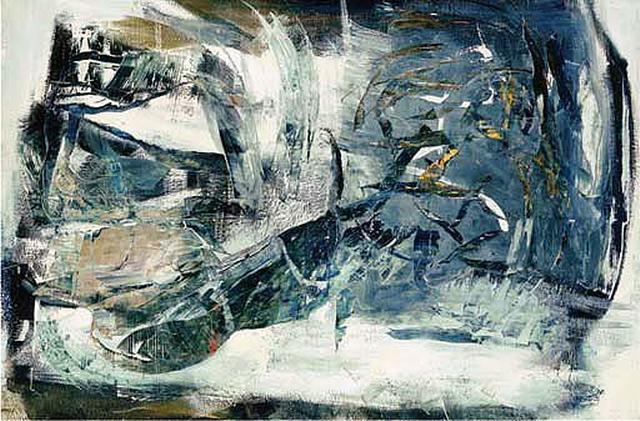Christopher Wood - known as Kit Wood. He had left his home for Paris with desires of being the greatest artist the world had ever known. However, Diaghilev rejected the commission for the ballet Russe. Kit was in no mind to adjust. And so, with a heavy addiction to opium he returned to the UK. He met and befriended Ben Nicholson and they travelled to St. Ives to paint.
Sadly he died aged 29. He jumped under a train and was killed. He was paranoid and mentally becoming quite unwell. His addiction to opium had escalated and no doubt contributed enormously to his mental instability.
He moved to St. Ives when a commission in Paris was not liked and he was in no mind to adjust his work. In St. Ives he met with Ben Nicholson.


In his time, no doubt this paintings were truly avant-garde. A move away from painting literally and a step towards suggestion. A flatness with depth. I have no idea how to describe that better.
Ben Nicholson and Barbara Hepworth. They met and started a passionate affair, eventually marrying. They had triplets and as a result of the bombings in London moved to the safety of St. Ives. Later Ben had an affair claiming Barbara was only interested in her sculptures. It's so saddening that something apparently so passionate ended in such heart ache. She looked up to him greatly still apparently despite how badly he treated her.


 Everything is so light. I learnt that his final studio was in fact bright white light. A stark whiteness.
Everything is so light. I learnt that his final studio was in fact bright white light. A stark whiteness.
 I was thrilled by the description of this piece by Barbara. According to the art historian Dr James Fox, Barbara was accused of being abstract. But she said she had captured the bay of St. Ives. The shape has been curled around. The white represents the beach and the lines are the waves as they roll in. I think it's stunning. I want it of course. At least I would like to see it at some time.
I was thrilled by the description of this piece by Barbara. According to the art historian Dr James Fox, Barbara was accused of being abstract. But she said she had captured the bay of St. Ives. The shape has been curled around. The white represents the beach and the lines are the waves as they roll in. I think it's stunning. I want it of course. At least I would like to see it at some time.
She was commissioned to sculpt for John Lewis in London

 Inspired by the standing stones in the area and to be found all over Devon and Cornwall. She remained in St. Ive and sadly died in a fire at her studio. Previously, she had been creating larger and larger sculptures. Her work was in demand. An unusual achievement really for a female to succeed as a sculptress. Considering her delicate look, there she was chipping away in a very demanding art form. She had assistants actually but if anyone visited they had to hide away.
Inspired by the standing stones in the area and to be found all over Devon and Cornwall. She remained in St. Ive and sadly died in a fire at her studio. Previously, she had been creating larger and larger sculptures. Her work was in demand. An unusual achievement really for a female to succeed as a sculptress. Considering her delicate look, there she was chipping away in a very demanding art form. She had assistants actually but if anyone visited they had to hide away.
Ben and Kit had discovered the prolific painter Alfred Wallis. I love that he was painting on anything he could find, bits of cardboard, drift wood etc etc.
He died in very lonely conditions. Such a pity. He was never taught to paint and his style was unusual at the times. He was to influenced by any academic points of view. He was painting without perspective. What he said was that he was painting as he remembered things. It seems sad he was having to deal with the loss through change via his art. I wonder if he was stuck?


 The very tiny house is apparently meant to be his brothers house. They had fallen out so he took out his anger through his painting. How funny!
The very tiny house is apparently meant to be his brothers house. They had fallen out so he took out his anger through his painting. How funny!


At one point during the Second World War, Piet Mondrian joined the St. Ives gang. Now this is interesting because when Barbara and Ben were leaving London, they bumped into Piet, they had beckoned to Piet to jump in the car and go with them. He refused, not liking the countryside.



Fleeing from Russia, Naum Gabo joined the accumulating group of artists. He struggled to acquire the artistic provisions he wanted. However he managed to persuade ICI to allow him to trial various new plastic they were experimenting with.
 So delicate. The shapes he said were inspired by everything around him in St. Ives - shells, rocks, coves, the sea ad so on.
So delicate. The shapes he said were inspired by everything around him in St. Ives - shells, rocks, coves, the sea ad so on.

 At the end of the war he left for New York.
At the end of the war he left for New York.
Terry Frost returned from the war and wanted to get far away from his home. So St. Ives was suggested as a bohemian centre. It was supposedly rivalling Paris at this time.


His son Anthony Frost is also an artist.
 I didn't like these quite as much.
I didn't like these quite as much.
Peter Lanyon arrived ....
He wanted to get close to the feel of the place. He ran up hills to be caught by surprise by the view. He lay beneath the sky. He got wet getting close to the sea. He stood on the edge of the cliffs and climbed rocks. Eventually he got his solo pilots licence and glided over the countryside of St. Ives. All influencing his works.
Sadly his glider crashed and as a result of the injuries he died 4 days later.


Art critic Patrick Heron put down the pen and picked up the brushes. A good friend of Lanyon's.He lived up on a the cliffs. A harsh area to live and endure the elements at their roughest.
His work was influenced by the views from the windows of his house and also doors influenced him.


 He also took great pleasure in putting colours on colours. He found the painting of the last bit of white where a new colour met another precious on painted exhilarating
He also took great pleasure in putting colours on colours. He found the painting of the last bit of white where a new colour met another precious on painted exhilarating

A very interesting art history lesson.
Now I would like to venture down there and visit the Tate St. Ives and also Hepworths gallery.
Yes I will see if there is a way to get there and maybe camp locally.
Bliss
XX
Sadly he died aged 29. He jumped under a train and was killed. He was paranoid and mentally becoming quite unwell. His addiction to opium had escalated and no doubt contributed enormously to his mental instability.
He moved to St. Ives when a commission in Paris was not liked and he was in no mind to adjust his work. In St. Ives he met with Ben Nicholson.


In his time, no doubt this paintings were truly avant-garde. A move away from painting literally and a step towards suggestion. A flatness with depth. I have no idea how to describe that better.
Ben Nicholson and Barbara Hepworth. They met and started a passionate affair, eventually marrying. They had triplets and as a result of the bombings in London moved to the safety of St. Ives. Later Ben had an affair claiming Barbara was only interested in her sculptures. It's so saddening that something apparently so passionate ended in such heart ache. She looked up to him greatly still apparently despite how badly he treated her.


 Everything is so light. I learnt that his final studio was in fact bright white light. A stark whiteness.
Everything is so light. I learnt that his final studio was in fact bright white light. A stark whiteness.  I was thrilled by the description of this piece by Barbara. According to the art historian Dr James Fox, Barbara was accused of being abstract. But she said she had captured the bay of St. Ives. The shape has been curled around. The white represents the beach and the lines are the waves as they roll in. I think it's stunning. I want it of course. At least I would like to see it at some time.
I was thrilled by the description of this piece by Barbara. According to the art historian Dr James Fox, Barbara was accused of being abstract. But she said she had captured the bay of St. Ives. The shape has been curled around. The white represents the beach and the lines are the waves as they roll in. I think it's stunning. I want it of course. At least I would like to see it at some time.She was commissioned to sculpt for John Lewis in London

 Inspired by the standing stones in the area and to be found all over Devon and Cornwall. She remained in St. Ive and sadly died in a fire at her studio. Previously, she had been creating larger and larger sculptures. Her work was in demand. An unusual achievement really for a female to succeed as a sculptress. Considering her delicate look, there she was chipping away in a very demanding art form. She had assistants actually but if anyone visited they had to hide away.
Inspired by the standing stones in the area and to be found all over Devon and Cornwall. She remained in St. Ive and sadly died in a fire at her studio. Previously, she had been creating larger and larger sculptures. Her work was in demand. An unusual achievement really for a female to succeed as a sculptress. Considering her delicate look, there she was chipping away in a very demanding art form. She had assistants actually but if anyone visited they had to hide away.Ben and Kit had discovered the prolific painter Alfred Wallis. I love that he was painting on anything he could find, bits of cardboard, drift wood etc etc.
He died in very lonely conditions. Such a pity. He was never taught to paint and his style was unusual at the times. He was to influenced by any academic points of view. He was painting without perspective. What he said was that he was painting as he remembered things. It seems sad he was having to deal with the loss through change via his art. I wonder if he was stuck?


 The very tiny house is apparently meant to be his brothers house. They had fallen out so he took out his anger through his painting. How funny!
The very tiny house is apparently meant to be his brothers house. They had fallen out so he took out his anger through his painting. How funny!

At one point during the Second World War, Piet Mondrian joined the St. Ives gang. Now this is interesting because when Barbara and Ben were leaving London, they bumped into Piet, they had beckoned to Piet to jump in the car and go with them. He refused, not liking the countryside.



Fleeing from Russia, Naum Gabo joined the accumulating group of artists. He struggled to acquire the artistic provisions he wanted. However he managed to persuade ICI to allow him to trial various new plastic they were experimenting with.
 So delicate. The shapes he said were inspired by everything around him in St. Ives - shells, rocks, coves, the sea ad so on.
So delicate. The shapes he said were inspired by everything around him in St. Ives - shells, rocks, coves, the sea ad so on.
Terry Frost returned from the war and wanted to get far away from his home. So St. Ives was suggested as a bohemian centre. It was supposedly rivalling Paris at this time.

His son Anthony Frost is also an artist.
 I didn't like these quite as much.
I didn't like these quite as much.Peter Lanyon arrived ....
He wanted to get close to the feel of the place. He ran up hills to be caught by surprise by the view. He lay beneath the sky. He got wet getting close to the sea. He stood on the edge of the cliffs and climbed rocks. Eventually he got his solo pilots licence and glided over the countryside of St. Ives. All influencing his works.
Sadly his glider crashed and as a result of the injuries he died 4 days later.


Art critic Patrick Heron put down the pen and picked up the brushes. A good friend of Lanyon's.He lived up on a the cliffs. A harsh area to live and endure the elements at their roughest.
His work was influenced by the views from the windows of his house and also doors influenced him.


 He also took great pleasure in putting colours on colours. He found the painting of the last bit of white where a new colour met another precious on painted exhilarating
He also took great pleasure in putting colours on colours. He found the painting of the last bit of white where a new colour met another precious on painted exhilarating
A very interesting art history lesson.
Now I would like to venture down there and visit the Tate St. Ives and also Hepworths gallery.
Yes I will see if there is a way to get there and maybe camp locally.
Bliss
XX